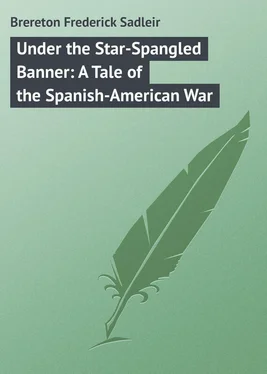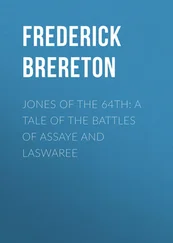Frederick Brereton - Under the Star-Spangled Banner - A Tale of the Spanish-American War
Здесь есть возможность читать онлайн «Frederick Brereton - Under the Star-Spangled Banner - A Tale of the Spanish-American War» — ознакомительный отрывок электронной книги совершенно бесплатно, а после прочтения отрывка купить полную версию. В некоторых случаях можно слушать аудио, скачать через торрент в формате fb2 и присутствует краткое содержание. Жанр: foreign_prose, foreign_children, на английском языке. Описание произведения, (предисловие) а так же отзывы посетителей доступны на портале библиотеки ЛибКат.
- Название:Under the Star-Spangled Banner: A Tale of the Spanish-American War
- Автор:
- Жанр:
- Год:неизвестен
- ISBN:нет данных
- Рейтинг книги:5 / 5. Голосов: 1
-
Избранное:Добавить в избранное
- Отзывы:
-
Ваша оценка:
- 100
- 1
- 2
- 3
- 4
- 5
Under the Star-Spangled Banner: A Tale of the Spanish-American War: краткое содержание, описание и аннотация
Предлагаем к чтению аннотацию, описание, краткое содержание или предисловие (зависит от того, что написал сам автор книги «Under the Star-Spangled Banner: A Tale of the Spanish-American War»). Если вы не нашли необходимую информацию о книге — напишите в комментариях, мы постараемся отыскать её.
Under the Star-Spangled Banner: A Tale of the Spanish-American War — читать онлайн ознакомительный отрывок
Ниже представлен текст книги, разбитый по страницам. Система сохранения места последней прочитанной страницы, позволяет с удобством читать онлайн бесплатно книгу «Under the Star-Spangled Banner: A Tale of the Spanish-American War», без необходимости каждый раз заново искать на чём Вы остановились. Поставьте закладку, и сможете в любой момент перейти на страницу, на которой закончили чтение.
Интервал:
Закладка:
F. S. Brereton
Under the Star-Spangled Banner: A Tale of the Spanish-American War
CHAPTER I
THE MARCHANT FOUNDRY
The city of Birmingham was wrapped in a mantle of fog so dense that the inhabitants found it difficult to move about. The thick, soot-laden atmosphere covered everything, and only a few faintly glimmering lights showed that they really existed.
The clock in the church tower had just struck two, and yet the street lamps were ablaze.
The pedestrians moved with the utmost care. Trudging along the soppy pavements, their footsteps sounded hollow and unreal, and were heard long before they themselves put in an appearance.
One of the inhabitants, however, contrived to find his way with comparative ease, for he was such an old resident that his feet would not go astray, however absent-minded their owner happened to be. There was a certain air of authority about him; yet there was that about the stern, calm features that denoted a warm heart and a kindly disposition. But still, as if the fog was not in existence, he hurried on, turning from the main street to the lower part of the town.
Ordinarily he could never accomplish this walk without meeting many an acquaintance, for Mr. Thomas Marchant was a well-known man. He was one of the magnates of this busy town, a wealthy employer of labor, and it was to the work his foundries gave that many of the inhabitants owed their prosperity.
Mr. Marchant was troubled; for only a year ago he was one of the wealthiest men in the city. His foundries were working night and day, and even then could hardly keep pace with the orders.
"I've never known such a rush," he said to his manager when discussing the matter. "It gives me great satisfaction, for our men will benefit by the increased orders as well as ourselves."
That was a short year ago, and now there was a different tale to tell. True, the iron foundry was still in full swing, but cotton mills, which Mr. Marchant owned in addition, were losing money every day, and in those few months he had been ruined; and he knew that the world would know him and speak of him as a bankrupt, while his possessions would be seized upon by the creditors.
The Marchant iron-works were in full swing. As Mr. Marchant entered, a mass of sputtering iron was dragged by a powerful man, dressed in rough trousers and thin vest, and protected by an apron of leather. Another dark and perspiring figure came to his aid, and the weight was dropped onto a small trolley, on which it was run to the big steam hammer standing near at hand.
Mr. Marchant watched them a moment, and then walked to his office, in which a somewhat untidily dressed gentleman was sitting.
"Good-day, Mr.Tomkins," he said.
"Good-afternoon, sir," Mr. Tomkins, who was the manager of the foundry, responded. Then, in a doubtful manner, he said, "There have been some visitors to see you this morning, and I told them to come again. One was Steinkirk."
"Does Hal know? Has he been told?" Mr. Marchant asked abruptly.
"No one has liked to break the news to him yet, sir. We weren't certain, and we hoped that things would turn out all right. I suppose it's hopeless now, sir?"
"Absolutely!" Mr. Marchant replied. "I am irretrievably ruined. The mills are gone, and to obtain money when the times were bad, I had to mortgage these works. I have nothing left. But I have seen to one matter; if trouble has come upon me, there is no reason why it should swamp all whom I employ. The creditor will carry on the work, and you and all the others will remain as at present. Poor Hal! He is the one who will suffer, more even than his father. He is a beggar!" He sank his face into his hands and groaned.
"It's not so bad as that, sir," said Mr. Tomkins. "Hal's got plenty of spirit, and if there's no money, why, he'll put his shoulder to the wheel. You should see how he works here. He's in the casting-shed, and to look at him any day you'd think he had his bread to earn."
"Which he has from this moment," Mr. Marchant exclaimed. "You do me good, Tomkins. When I was a lad I had nothing. I had literally to slave for years, and to deny myself many a long day. Then fortune came with a rush which almost overwhelmed me. It has gone almost more quickly, and I must learn to make the best of my troubles. As for Hal, I think you are right. Let us go across and see him."
They left the office and entered a shed in which a number of men were at work. In a corner one of them was ramming a plug of clay into the orifice of a furnace, and was replacing the lining of similar material which protected the trough down which the molten metal was destined to run. At the end of the trough was an enormous bucket, suspended from a crane, which traveled backwards and forwards overhead.
The remainder of the shed was occupied with castings, or rather, with molds in various stages of preparation. Here and there were artisans at work, and amongst them, kneeling on the sand which covered the floor, was a youth who might well be taken for the son of a foundry hand. He was between seventeen and eighteen years of age, and of more than medium height. Dressed in a pair of rough trousers and a flannel shirt, he was to the casual observer merely an ordinary employee. But there was a certain something about this young fellow that made him different from the others at work in the shed. There was a grace about his figure, while his features were more refined than those commonly met with amongst the working classes.
This was the son of the owner, and he was known to all at the foundry as Hal Marchant.
It was delicate work upon which he was engaged. With a special tool he was smoothing down the mold, carefully rounding off corners, building up a portion here which had broken down. Finally he sat up, and, surveying the work with an air of satisfaction, exclaimed:
"That's finished, and I think it'll do. Now I'll get the foreman to pass it, and then we'll see it cast. Hallo! The guv', as I live! Why, you made me jump. What do you think of that?"
"Very good, old boy," Mr. Marchant replied. "You are an adept at the trade. What says the foreman?"
"He knows what he's up to, he does," the latter remarked. "Another week or so of this work and he'll be fit to boss the shed."
"Ah, that's satisfactory," said Mr. Marchant. "But I've something to say to you, Hal, so come to the office."
He turned and walked from the shed, taking no notice of the friendly glances his workmen threw in his direction.
"What can be wrong with the guv'?" he asked, looking after Mr. Marchant, and then at the manager. "What is it, Tomkins? Tell me."
For a moment the manager of the works wavered, uncertain whether to tell the truth.
"After all, he's got to know, sooner or later," he murmured. "Something's wrong, Hal," he continued. "There's no use in beating about the bush any longer. My only surprise is that you haven't seen for yourself that things were completely upset. I suppose every workman here knows what is going on, and it seems strange that they haven't dropped you a hint. The fact is, the foundry is broken, and the owner has lost every penny he possessed. He's ruined, and the works go to a creditor."
"Ruined! Part with the works! Why, we are full of orders, and by all accounts are in the most thriving condition!"
"Just so, Hal, that's the bitter pill about this matter. The cotton mills up Preston way have broken. For two years they have been working at a dead loss. Your father mortgaged the mills, hoping to tide over bad times. But instead of improving they became even worse. Then the foundry had to go to raise the money. The folks who advanced the money have claimed it, and your father is unable to pay; so the long and short of it is that he no longer owns these works; and, to put it bluntly, he has scarcely a sixpence left, and both he and you must work for a living."
Читать дальшеИнтервал:
Закладка:
Похожие книги на «Under the Star-Spangled Banner: A Tale of the Spanish-American War»
Представляем Вашему вниманию похожие книги на «Under the Star-Spangled Banner: A Tale of the Spanish-American War» списком для выбора. Мы отобрали схожую по названию и смыслу литературу в надежде предоставить читателям больше вариантов отыскать новые, интересные, ещё непрочитанные произведения.
Обсуждение, отзывы о книге «Under the Star-Spangled Banner: A Tale of the Spanish-American War» и просто собственные мнения читателей. Оставьте ваши комментарии, напишите, что Вы думаете о произведении, его смысле или главных героях. Укажите что конкретно понравилось, а что нет, и почему Вы так считаете.












